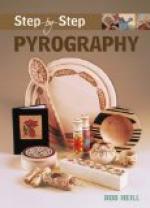Meanwhile Dickon had eyed with a great fascination the Templar’s sword, a magnificent piece of steel-work, blade and scabbard ornamented with curious inlay-work of gold. He dared not ask about it even if he could have made his question understood. The knight spoke only Norman and a little mixed French and English, and Dickon knew scarcely a word of any language but Saxon. When his father had come home and the knight had gone on his way, Dickon asked eager questions.
“’Tis a sword of Damascus,” the old smith said shortly. “Belike he got it where he’s been—in the Holy Land.”
“Is’t holy work then?” The boy knew as much of Palestine as he did of the planet Mars, the folk of his acquaintance being little given to pilgrimage.
Adam Smith snorted. “Nay, ’tis paynim work. Damascus is a heathen city. I mind somebody telling me that the only man that could forge that steel had been carried off to another country, so that no more of it could be made. They have a won’erful knowledge of metal-work, those infidels.”
“Belike Satan taught ’em,” grunted Wat of the Weald. “I don’t hold wi’ such trickery myself.”
Adam straightened his back and shook his white head. “Satan never did work as good as yon sword,” he chuckled. “’Tis a joy to the touch. Nay, lad, Satan teaches men to be idle—that’s his cunning.”
Dickon grinned, for Wat was never known to work save when driven, and like many others of his temper, looked at all devices for the increase of output with disfavor. Evidently there was no light on the subject of Damascus blades to be gained here, but the boy never forgot the look of that sword.
As he grew up he saw and heard other things which fitted in with the memory—Toledo blades that were said to be Moorish work, damascened and jeweled daggers, now and then a piece of splendid armor worn in tournaments where royalty itself looked on—Milanese and Spanish work rich with gold. But always the keenest edge and finest steel came of that mysterious heathen forging. Now, thinking of Audrey out in the great world, he determined to see that world for himself and find out whether he, a common smith’s son, had any chance of learning the secrets of the Armorer’s Guild.
Winchester was a greater city than he had any idea it would be, but he found his way to the house of Lady Adelicia only to learn that she had gone to Normandy, taking with her some of her household. Audrey, her own waiting-woman, had gone with her. Dickon went down to Southampton and took passage to Calais. He had not much money, but a smith as good as he was could get a living almost anywhere. There were plenty of English in Normandy, for both that province and Aquitaine were fiefs held by the King of England as a vassal of the King of France. It was often said that the vassal in this case held more land than his lord.
Without much trouble Dickon found the Norman castle he sought, but to his dismay, the lady was just about to set out on a pilgrimage to Jerusalem. Sir Stephen Giffard, her husband, had been fighting against the Moors in Spain, and she feared that he was dead. She had decided upon this pilgrimage in the hope that her prayers and offerings at the shrine of Our Lady might avail to bring her husband back to her.




